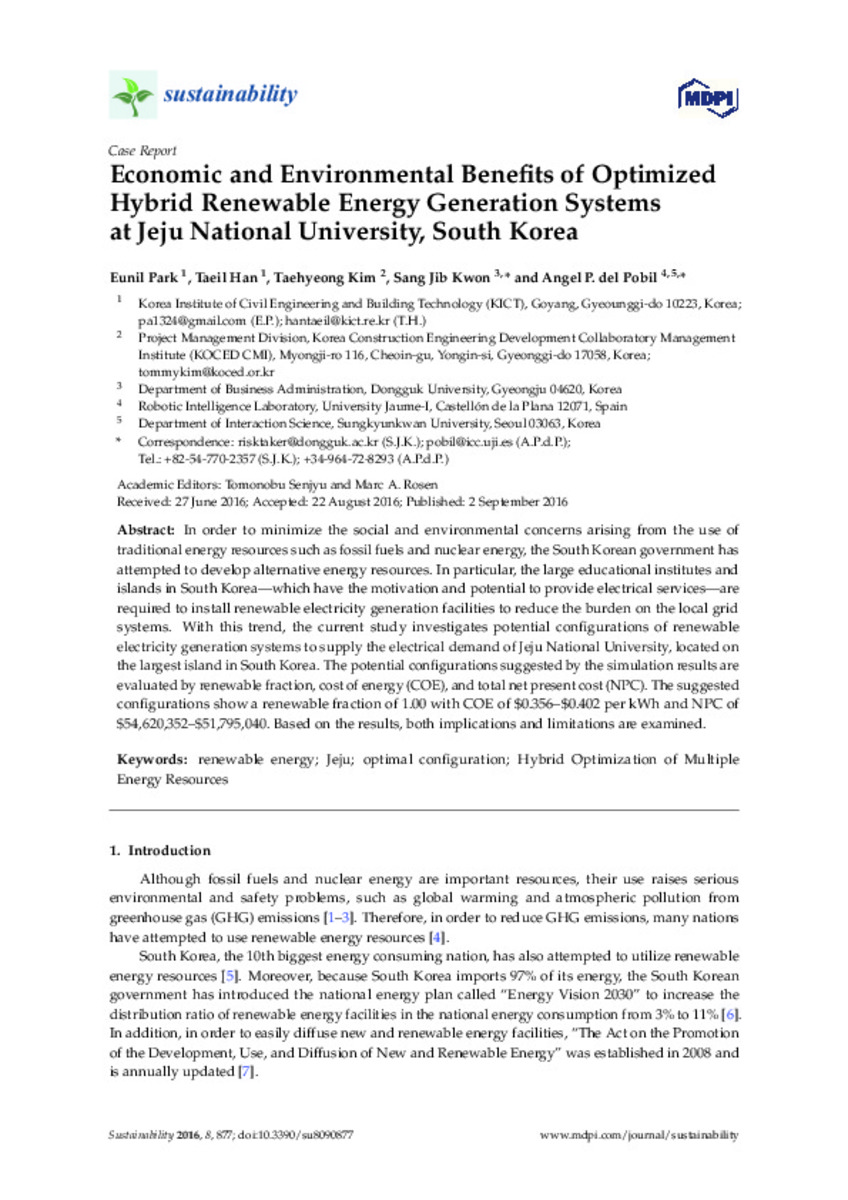Mostrar el registro sencillo del ítem
Economic and environmental benefits of optimized hybrid renewable energy generation systems at Jeju National University, South Korea
| dc.contributor.author | Park, Eunil | |
| dc.contributor.author | Han, Taeil | |
| dc.contributor.author | Kim, Taehyeong | |
| dc.contributor.author | Kwon, Sang Jib | |
| dc.contributor.author | del Pobil, Angel P. | |
| dc.date.accessioned | 2016-12-01T10:35:58Z | |
| dc.date.available | 2016-12-01T10:35:58Z | |
| dc.date.issued | 2016 | |
| dc.identifier.issn | 2071-1050 | |
| dc.identifier.uri | http://hdl.handle.net/10234/164845 | |
| dc.description.abstract | In order to minimize the social and environmental concerns arising from the use of traditional energy resources such as fossil fuels and nuclear energy, the South Korean government has attempted to develop alternative energy resources. In particular, the large educational institutes and islands in South Korea—which have the motivation and potential to provide electrical services—are required to install renewable electricity generation facilities to reduce the burden on the local grid systems. With this trend, the current study investigates potential configurations of renewable electricity generation systems to supply the electrical demand of Jeju National University, located on the largest island in South Korea. The potential configurations suggested by the simulation results are evaluated by renewable fraction, cost of energy (COE), and total net present cost (NPC). The suggested configurations show a renewable fraction of 1.00 with COE of $0.356–$0.402 per kWh and NPC of $54,620,352–$51,795,040. Based on the results, both implications and limitations are examined. | ca_CA |
| dc.description.sponsorShip | This study was supported by the Dongguk University Research Fund of 2015. Support for the UJI Robotic Intelligence Laboratory is provided in part by Ministerio de Economía y Competitividad (DPI2015-69041-R), by Generalitat Valenciana (PROMETEOII/2014/028) and by Universitat Jaume I (P1-1B2014-52). | ca_CA |
| dc.format.extent | 12 p. | ca_CA |
| dc.format.mimetype | application/pdf | ca_CA |
| dc.language.iso | eng | ca_CA |
| dc.publisher | MDPI (Multidisciplinary Digital Publishing Institute) | ca_CA |
| dc.relation.isPartOf | Sustainability 2016, 8, 877 | ca_CA |
| dc.rights | © 2016 by the authors; licensee MDPI, Basel, Switzerland. This article is an open access article distributed under the terms and conditions of the Creative Commons Attribution (CC-BY) license (http://creativecommons.org/licenses/by/4.0/). | ca_CA |
| dc.rights | Atribución 4.0 España | * |
| dc.rights.uri | http://creativecommons.org/licenses/by-sa/4.0/ | * |
| dc.subject | renewable energy | ca_CA |
| dc.subject | Jeju | ca_CA |
| dc.subject | optimal configuration | ca_CA |
| dc.subject | Hybrid Optimization of Multiple Energy Resources | ca_CA |
| dc.title | Economic and environmental benefits of optimized hybrid renewable energy generation systems at Jeju National University, South Korea | ca_CA |
| dc.type | info:eu-repo/semantics/article | ca_CA |
| dc.identifier.doi | http://dx.doi.org/doi:10.3390/su8090877 | |
| dc.rights.accessRights | info:eu-repo/semantics/openAccess | ca_CA |
| dc.relation.publisherVersion | http://www.mdpi.com/2071-1050/8/9/877 | ca_CA |
Ficheros en el ítem
Este ítem aparece en la(s) siguiente(s) colección(ones)
-
ICC_Articles [418]
Excepto si se señala otra cosa, la licencia del ítem se describe como: © 2016 by the authors; licensee MDPI, Basel, Switzerland. This article is an open access
article distributed under the terms and conditions of the Creative Commons Attribution
(CC-BY) license (http://creativecommons.org/licenses/by/4.0/).








